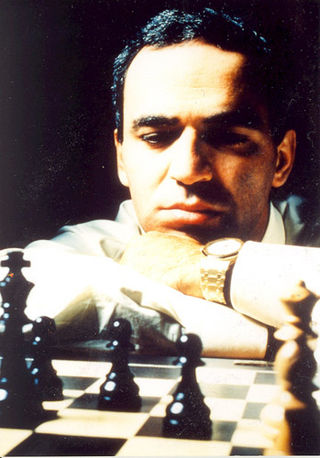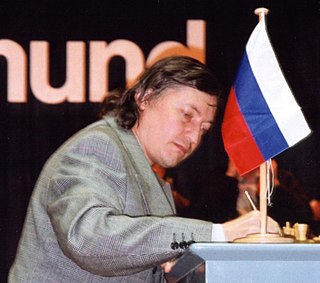Related Research Articles

Vladimir Borisovich Kramnik is a Russian chess grandmaster. He was the Classical World Chess Champion from 2000 to 2006, and the 14th undisputed World Chess Champion from 2006 to 2007.

The World Chess Championship is played to determine the world champion in chess. The current world champion is Gukesh Dommaraju, who defeated the previous champion Ding Liren in the 2024 World Chess Championship.

Viswanathan "Vishy" Anand is an Indian chess grandmaster, a former five-time World Chess Champion and a two-time Chess World Cup Champion. He became the first grandmaster from India in 1988, and he has the eighth-highest peak FIDE rating of all time. In 2022, he was the elected Deputy President of FIDE.

Veselin Aleksandrov Topalov is a Bulgarian chess grandmaster and former FIDE World Chess Champion.

Peter Leko is a Hungarian chess grandmaster and commentator. He became the world's youngest grandmaster in 1994. He narrowly missed winning the Classical World Chess Championship 2004: the match was drawn 7–7 and so Vladimir Kramnik retained the title. He also came fifth in the FIDE World Chess Championship 2005 and fourth in the World Chess Championship 2007.

Gata Kamsky is a Soviet-born American chess grandmaster, and a five-time U.S. champion.
The Professional Chess Association (PCA), which existed between 1993 and 1996, was a rival organisation to FIDE, the International Chess Federation. The PCA was created in 1993 by Garry Kasparov and Nigel Short for the marketing and organization of their Chess World Championship.
The Candidates Tournament is a chess tournament organized by FIDE, chess's international governing body, since 1950, as the final contest to determine the challenger for the World Chess Championship. The winner of the Candidates earns the right to a match for the World Championship against the incumbent world champion.

The Classical World Chess Championship 1995, known at the time as the PCA World Chess Championship 1995, was held from September 10, 1995, to October 16, 1995, on the 107th floor of the South Tower of the World Trade Center in New York City. Garry Kasparov, the defending champion, played Viswanathan Anand, the challenger, in a twenty-game match. Kasparov won the match after eighteen games with four wins, one loss, and thirteen draws.

The FIDE World Chess Championship 1996 was a chess tournament held by FIDE to determine the World Chess Champion.

The World Chess Championship 1993 was one of the most controversial matches in chess history, with incumbent World Chess Champion Garry Kasparov, and official challenger Nigel Short, splitting from FIDE, the official world governing body of chess, and playing their title match under the auspices of the Professional Chess Association. In response, FIDE stripped Kasparov of his title, and instead held a title match between Anatoly Karpov and Jan Timman.
Below is a list of events in chess in 1996, as well as the top ten FIDE rated chess players of that year.
Below is a list of events in chess in 1994, as well as the top ten FIDE rated chess players of that year.
Below is a list of events in chess in 1993, as well as the top ten FIDE rated chess players of that year.

The FIDE World Chess Championship 2002 was held in Moscow, Russia. The first six rounds were played between 27 November and 14 December 2001, and the final match started on 16 January and ended on 23 January 2002. The Ukrainian Grandmaster Ruslan Ponomariov, aged 18, won the championship and became the youngest FIDE World Champion.

The FIDE World Chess Championship 2000 was held in New Delhi, India, and Tehran, Iran. The first six rounds were played in New Delhi between 27 November and 15 December 2000, and the final match in Tehran started on 20 December and ended on 24 December 2000. The top seeded Indian Grandmaster Viswanathan Anand won the championship.

The FIDE World Chess Championship 1999 was held at Caesars Palace on the Las Vegas Strip between 31 July and 28 August 1999. The championship was won by Russian Alexander Khalifman, making him the FIDE World Chess Champion.

The FIDE World Chess Championship 1998 was contested in a match between the FIDE World Champion Anatoly Karpov and the challenger Viswanathan Anand. The match took place between 2 January and 9 January 1998 in Lausanne, Switzerland. The challenger was determined in a tournament held in Groningen, Netherlands, between 9 December and 30 December 1997. After the championship match ended in a draw, Karpov won the rapid playoff, becoming the 1998 FIDE World Chess Champion.

The World Rapid Chess Championship is a chess tournament held to determine the world champion in chess played under rapid time controls. Prior to 2012, FIDE gave such recognition to a limited number of tournaments, with non-FIDE recognized tournaments annually naming a world rapid champion of their own. Since 2012, FIDE has held an annual joint rapid and blitz chess tournament and billed it as the World Rapid & Blitz Chess Championships. FIDE also holds the Women's World Rapid & Blitz Chess Championship. The current rapid world champion is grandmaster Magnus Carlsen. Anastasia Bodnaruk from Russia is the current women's rapid world champion. Carlsen has won the event a record five times.
References
- ↑ THE WEEK IN CHESS 139, 7th July 1997
- ↑ THE WEEK IN CHESS 166, 12th January 1998. (It is possible that there is a mistake here and the editor wrote "Karpov" where he meant "Kasparov", but either way it shows a leading player unhappy with the format).
- ↑ Opening Ceremony for Wijk aan Zee Archived 16 May 2008 at the Wayback Machine , The Week in Chess, Special Report, 14-Jan-2000
- ↑ World Chess Championship 1997 FIDE Knockout Matches, Mark Weeks' Chess Pages
- ↑ World Chess Championship 1998 Karpov - Anand FIDE Title Match, Mark Weeks' Chess Pages
- ↑ The Week in Chess 249 - 16 August 1999
- ↑ World Chess Championship 1999 FIDE Knockout Matches, Mark Weeks' Chess Pages
- ↑ The Week in Chess 243 - 5 July 1999
- ↑ Chess Scotland - Las Vegas World Championship Archived 7 September 2009 at the Wayback Machine .
- ↑ The Week in Chess 273 - 13 March 2000
- ↑ The Week in Chess 295 - 3 July 2000
- ↑ World Chess Championship 2000 FIDE Knockout Matches, Mark Weeks' Chess Pages
- ↑ World Chess Championship 2001-02 FIDE Knockout Matches, Mark Weeks' Chess Pages